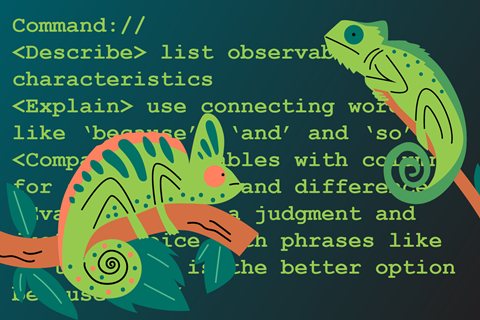Use these three strategies to help your 14–16 learners decode command words in assessments
Understanding and accurately interpreting command words during assessments is a critical skill for our students, particularly in subjects like chemistry. Command words such as describe, explain, compare and evaluate dictate the nature of the response expected.
Misunderstanding these words can result in incomplete or poor answers. Therefore, explicitly teaching students how to decode command words is essential to their success in exams (rsc.li/40mWpSG). Try these three strategies to help learners master this skill.
Misunderstanding these words can result in incomplete or poor answers. Therefore, explicitly teaching students how to decode command words is essential to their success in exams. Try these three strategies to help learners master this skill.
1. Introduce command words with examples early
It’s important to introduce students to command words as early as possible. Starting early allows students to internalise the meaning and requirements of each term long before they encounter them in assessments.
You can provide a glossary of command words with their definitions, and explicitly teach the differences between them. For example, describe asks for a detailed account of what happens, while explain requires reasons behind the event.

I typically use a chameleon as an example with my youngest classes. For a describe question, they might say, ‘A chameleon changes colour to blend in with its surroundings.’ For an explain question, they would add reasoning. Such as, ‘A chameleon changes colour to hide from predators or regulate its body temperature.’
Once students grasp the difference between these two command words, you can apply the same approach to other command words like compare and evaluate – here, they could compare plastic and paper bags, followed by evaluating their environmental impacts.
2. Use ‘If … then …’ scaffolding for responses
After students understand the differences between command words, they need scaffolds to help structure their answers correctly. For example, for a describe question, I instruct students to list observable characteristics. For an explain question, I encourage them to use connecting words like ‘because’, ‘and’ or ‘so’ to ensure they provide reasoning. When answering compare questions, some exam boards allow students to use tables with columns for similarities and differences. For evaluate questions, I teach students to make a judgment and justify their choice with phrases like ‘I think [X] is the better option because [Y].’
Download this
Example ‘If … then …’ worksheet to help students master command words from Education in Chemistry: rsc.li/xxxxxx
It’s important to introduce command words gradually to avoid overwhelming students. Start with less demanding commands, ensuring students fully understand them before moving on to more complex commands. I often create an ‘If … then …’ cheat sheet for my exam classes, which outlines both the meaning of the command words and strategies for answering them correctly.
3. Integrate peer review for immediate feedback
Peer review is an effective way to reinforce the correct interpretation of command words and ensure students are using the appropriate scaffolds in their answers. After completing practice questions, I have students swap their responses with a partner for review. I encourage them to focus on whether their peer has correctly interpreted the command word and met its demands. This process benefits both the reviewer and the original responder by providing immediate, relevant feedback. It also saves me time from having to review every answer individually.
Peer review is an effective way to reinforce the correct interpretation of command words and ensure students are using the appropriate scaffolds in their answers (rsc.li/3CaZ8Em). After completing practice questions, I have students swap their responses with a partner for review. I encourage them to focus on whether their peer has correctly interpreted the command word and met its demands. This process benefits both the reviewer and the original responder by providing immediate, relevant feedback. It also saves me time from having to review every answer individually.
Teacher tips
- Incorporate practice exercises where students match command words with example responses. This can serve as a quick formative assessment to gauge understanding.
- As a stretch activity, ask students to create their own ‘If … then…’ response sheets for different command words.
- Use the ‘If … then …’ cheat sheets as rubrics during peer review. This helps guide the process and ensures students stay focused on the command words.
Common pitfalls
A common pitfall in teaching command words is assuming students understand them after a single lesson. Continual retrieval and reinforcement are crucial.
Another important consideration is context. The same command word may require different responses depending on the chemistry topic at hand. For example, compare might be approached differently when discussing elements in the periodic table than when addressing reaction mechanisms. Always tailor your instruction and practice to the specific content you are teaching.
Another important consideration is context (rsc.li/3Uq3bD6). The same command word may require different responses depending on the chemistry topic at hand. For example, compare might be approached differently when discussing elements in the periodic table than when addressing reaction mechanisms. Always tailor your instruction and practice to the specific content you are teaching.
In summary, explicitly teaching students how to decode command words and structure their answers accordingly is crucial for their success in assessments. Introducing these words early, providing structured scaffolds and incorporating peer review are all effective strategies. Continual reinforcement and considering the context of the command words will help students master this vital skill.
Joanne Crofts
Downloads
If ... then ... example worksheet
PDF, Size 0.12 mbIf ... then ... example worksheet
Word, Size 0.43 mb











No comments yet